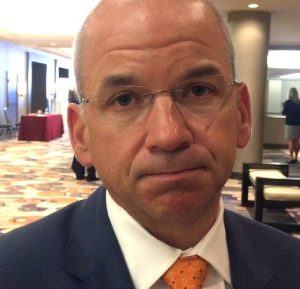State Chamber says it will dial up lobbying efforts on Arkansas issues, government policies
by October 23, 2016 9:20 am 302 views

The Arkansas State Chamber of Commerce has always been active in pushing business interests, but on Friday (Oct. 21) chamber Board Vice Chairman Joe Carter said the group plans to ratchet up lobbying efforts “as though our future depends on it – because it does.”
Carter, owner of North Little Rock-based Snyder Environmental, began his remarks before a large crowd gathered at the Little Rock Marriott for the 88th Annual Meeting of the chamber and Associated Industries of Arkansas (AIA), with dramatic flair, quoting from Robert Maynard Hutchins’ 1952 book, “Great Books of the Western World.”
“The death of democracy is not likely to be an assassination from ambush. It will be a slow extinction from apathy, indifference, and undernourishment,” Carter said in quoting Hutchins.
He told the crowd that most leading chambers and other similar pro-business organizations in other states have significantly more political action committee (PAC) money than the state chamber and AIA. For example, he said the leading business organization in Alabama has around $4 million a year available for lobbying, while the Arkansas chamber has just $50,000 dedicated.
Carter said the chamber and AIA will need more money to have a bigger voice.
2016 BALLOT ISSUES
However, the organization has been able to raise a lot of money and collaborate with other organizations to support or oppose 2016 ballot items.
For example, the state chamber is leading the Jobs for Arkansas campaign to support Issue 3 on the November ballot. The amendment would remove the state required 5% state general revenue cap on general obligation bonds tied to industrial projects. Issue 3 is one of three Arkansas Legislature initiated amendments on the ballot this year. It would also allow local governments to incentivize private corporations with taxpayer money, and it would allow local governments to use taxes to pay chamber organizations to spur economic development.
The chamber has managed the collection of $313,400 – as of Oct. 14 – to push for voter approval of Issue 3. The chamber has committed $46,000 to Issue 3, according to filings with the Arkansas Ethics Commission. The Northwest Arkansas Council also gave $10,000 to the cause, Murphy Oil USA gave $15,000, Stephens Investment Holdings gave $20,000, and Arkansas Economic Development Foundation gave $55,000.
The state chamber is also the leader on fighting two medical marijuana initiatives, but only put $1,000 toward the effort. The AsaPac, a fund directed by the governor has put in $10,000 toward the fight, as have the Arkansas Farm Bureau Federation and the Arkansas Heart Hospital.

Financial support of the state chamber’s lobbying work does not include the salary of Kenny Hall, executive vice president of the state chamber/AIA, who is a representative for the organization on Arkansas Ethics Commission documents identifying money collected and spent on the Issue 3 campaign.
NEW STRATEGIES, ISSUE FOCUS
Carter said the chamber/AIA membership accounts for at least 60% of the state’s non farm payroll employment, and because of that there is “no better group than this group” to represent the state’s business interests.
“We need you in lockstep with us,” Carter told the Friday crowd, adding that chamber members would soon see more “opportunities to contribute” to PAC funds.
He said workforce development, good roads, “fair courts,” and “non-divisive” political leadership would be some of the areas on which the chamber would focus. Broad strategies the chamber will push, according to Carter’s relatively short but passionate speech, include “uniting as business people,” supporting “prudent leadership” while holding accountable political leaders who push social or economic policies that might damage the state’s image and business foundation, and “move with speed” to support its agenda.
Carter said after the meeting that fringe political interests on both sides of the spectrum don’t always best represent what the state chamber considers sound economic policy.
“The Arkansas State Chamber/AIA is getting serious about PAC contributions because we believe that is the best medium for the voice of the moderate,” Carter told Talk Business & Politics after the meeting. “We believe other interest groups have taken priority, and as a result, economic prosperity has taken a backseat in Arkansas.”
LEGISLATIVE PRIORITIES
Following are priority issues for the Arkansas Chamber/AIA in the upcoming 91st General Assembly of the Arkansas Legislature.
• Taxes
Areas of focus include “a compete reduction” on the sales tax related to new manufacturing equipment, and eliminating property tax on inventory.
• Workers’ compensation
The chamber/AIA plans to lobby for reduced costs related to closing of a death and disability trust fund and reducing opioid abuse.
• Healthcare
The chamber/AIA plans to support renewal of the Arkansas Works program, which is Gov. Asa Hutchinson’s version of what the state must do under the federal health care law typically known as Obamacare.
• Economic development
There are numerous targeted areas in this category, including renewal of the $50 million Quick Action Closing Fund, a review of the “resource allocations” of the Arkansas Economic Development Commission, and improving the “competitiveness of corporate income tax incentives.”
• Education
The chamber/AIA continues to push to move school board elections to the general election schedule. School board elections are now held in September. Several groups, including the state’s public school superintendents, have opposed such a move.
• Labor and Employment
Look at state laws on discharge laws and laws related to “donning and doffing.”
• Unemployment insurance
The focus is on developing a system that keeps rates as low as possible, but maintains a “solvent trust fund,” with the best benefits possible.
